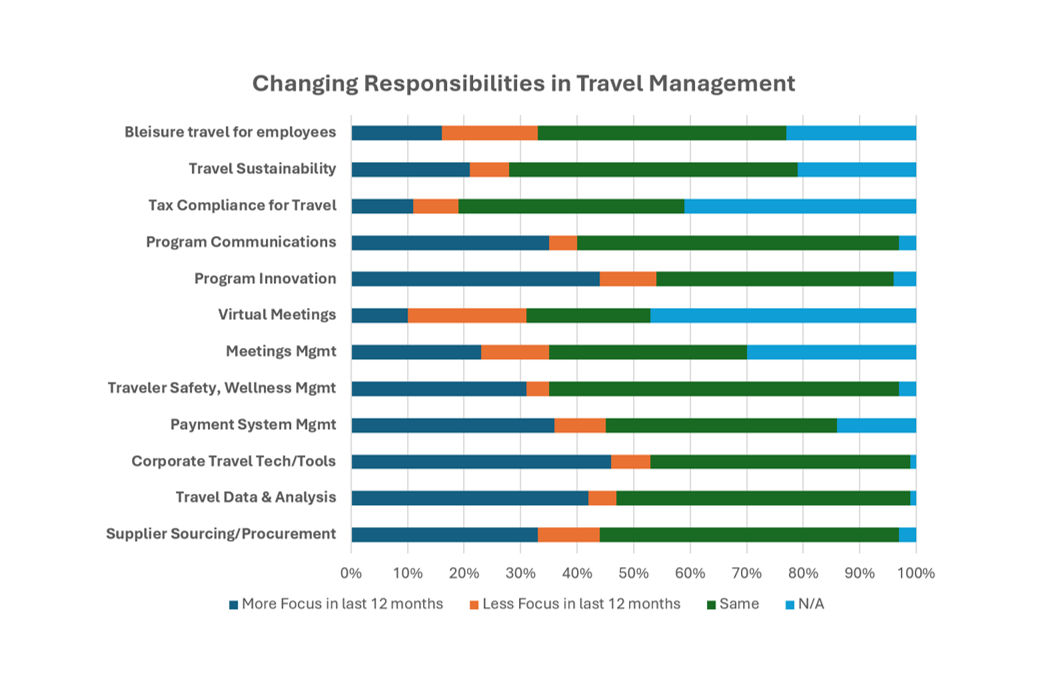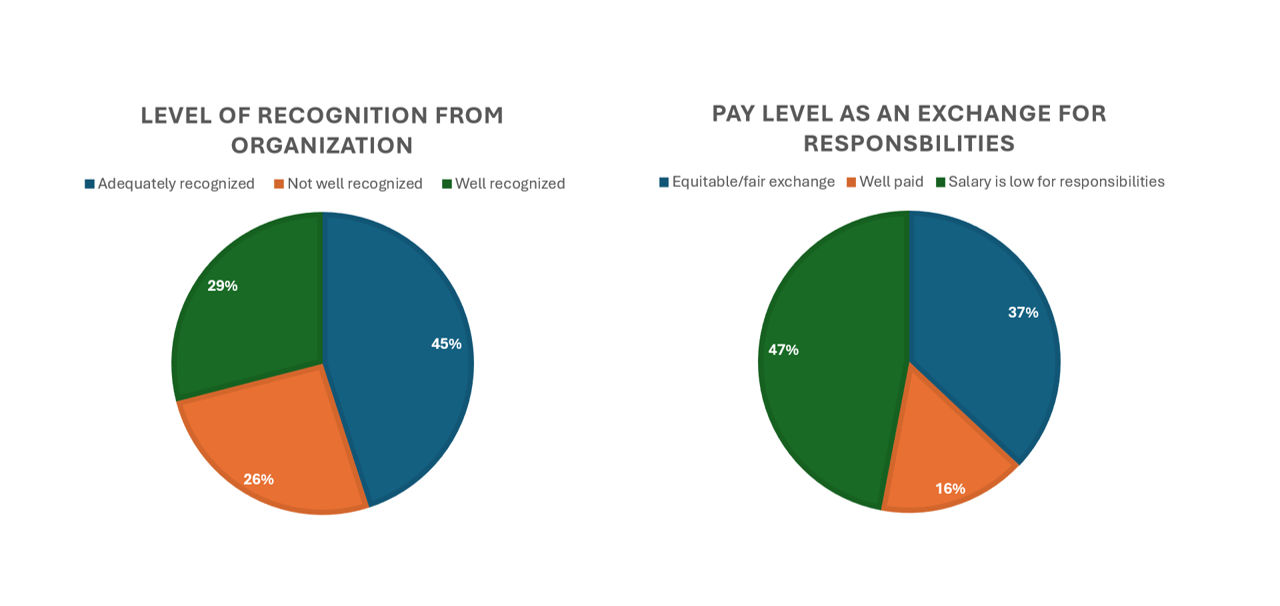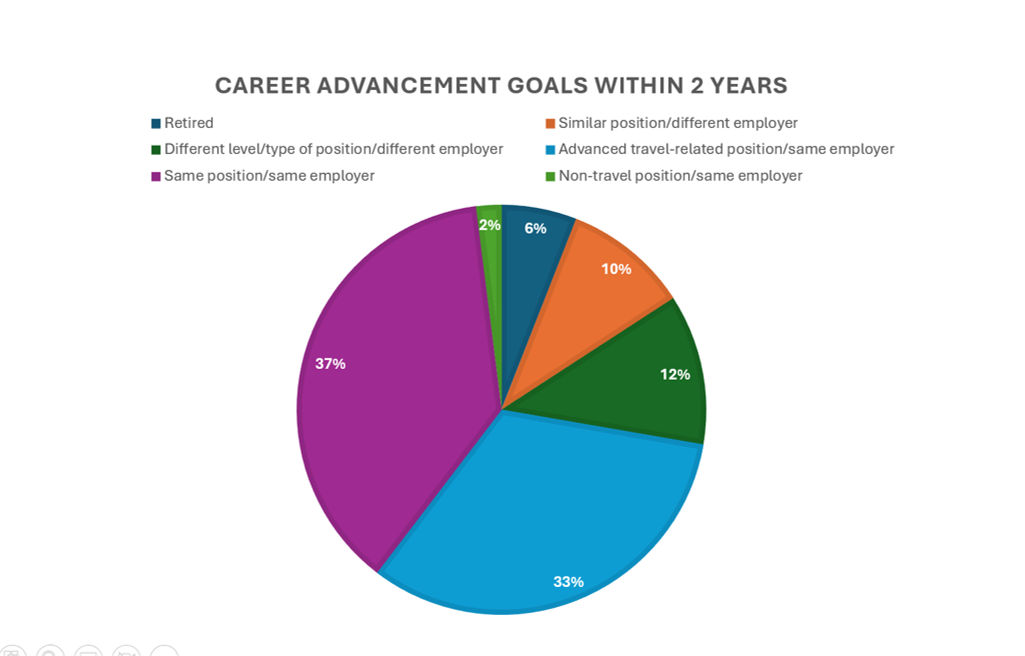2024 Average SME Travel Manager Salary: $119,958
There’s a lot that goes into that number, so lets’
take a deeper dive and see where you fit.
For SME travel managers in 2024, there’s good news and bad
news in that top line number. First, the bad news: The 2024 respondent set that
managed travel for programs with $1 million to $24.9 million in total annual
spend reported a 2.4 percent lower salary than the respondent set for BTN’s
2023 Salary Survey, where the average SME travel manager salary came in at just
over 123,000. However, that doesn’t mean that on an individual basis, SME
travel managers are losing ground with their salaries. Another way to look at
it—rather than comparing the 2023 cohort of respondents to 2024, is to see what
BTN’s travel manager respondents in the latest survey actually told us about
the direction of their salaries.
Looking at the same group of travel managers year over year,
salaries improved in 2024 by 4.8 percent. The 2024 cohort of respondents
reported their 2023 salaries at an average of $114,412. Seventy-two percent of
respondents saw an increase in their salaries in 2024, some by more than 20
percent. Twenty percent of respondents said their salaries remained steady, and
just 8 percent reported that they brought in less in 2024 than they did in
2023.
There are plenty of other stats worth considering, however,
when comparing your salary to a benchmark.
Travel Program Size
Like the results of BTN’s full survey—which also included
program spending bands of $25 million to $49.9 million, $50 million to $100
million and those that invest more than $100 million in travel annually—the
larger the travel program grows, the higher the average salary for the travel
manager. That’s a rule of thumb. It didn’t hold precisely for our 2024 SME cohort,
given the 2.5 percent salary dip seen for travel managers at the helm of $3
million to $9.9 million programs.
Keep in mind that within each average—and because travel
managers for SME programs often hold other job functions from office managers
to heads of finance—salaries can vary widely, especially in the lower spending
bands. (Check out the next section on job title.)
Who’s Managing Travel?
Just 22 percent of SME respondents to BTN’s 2024 Salary
Survey manage travel as their full-time position, and most of those individuals
were running travel programs in the largest SME band $10 million to $24.9
million in annual spend. As BTN finds perennially in its Salary Survey, the
travel management function in a small or midsize company can land in numerous
positions across the org chart. The below is a rough guide to such positions
among the 156 small and midsize travel managers who responded to the Dec. 2024
survey, along with the average salary levels for each title.
Especially for the lower salary bands in the SME universe,
leveling up comes with significant compensation leaps. Moving from a travel
coordinator position to travel specialist spikes a salary by almost 19 percent.
Moving from travel specialist to a full-fledged travel manager can grow the
average salary by about 12.5 percent. After that point, the percentages taper
off a bit, but graduating to a senior or global travel manager role still
increases a salary on average by about $12,000 annually, representing a nearly
11 percent increase. Travel management within the SME sector offers a clear
trajectory for salary advancement.
.png)
The biggest salary jump is seen when titles step away from
travel management proper into a senior centralized position of vice president,
senior vice president and above. BTN received limited data for this title
category, so keep in mind that variations in that data set could skew the
salary level. That said, if we threw out the top and bottom salary in that set,
the average salary remained pretty steady around $185,000 so we feel confident
in providing this as a general benchmark. In this title set, as well, fewer
hours are spent dedicated to travel management directly. There may be an
individual reporting to this title who has more direct management of the
category.
Longevity
Once in travel, always in travel? There are definitely some
die-hard travel managers out there and they thrive in this complex industry where
it seems there are never two days that are the same. Sticking to the role, as
seen in the previous “Salary by Job Title” chart can offer career advancement
opportunities that come with seniority.
.png)
All these factors overlap when looking at salary levels, so
keep in mind that years in the role and more senior titles often can go
together. Here’s where our 2024 respondent cohort netted out when considering
only how many years they had spent in the practice (note: this is not
necessarily years in the same job or for a single company).
The Travel Management Function Is Changing
Every year BTN asks travel managers how their role is
evolving—what responsibilities might be waning with time or becoming less
effective with changing market dynamics and what skills travel managers now
need to develop to remain relevant and effective in their roles.
Tech, Data, Innovation on the Rise
The trend line this year was very clear. Travel managers for
small and midsize programs are focusing significantly more on travel (and
expense) technology solutions, data analysis and an overall drive for more
innovation in their travel programs.
Forty-six percent of SME travel managers said they were more
focused in the last 12 months on corporate travel technology and booking tools,
while 44 percent said they were more focused on travel program innovation than
they had been 12 months ago. Forty-two percent said they were analyzing more
data as they looked to optimize and innovate with their programs. That’s on top
of a spike in focus on the same areas in the previous 12-month period, as shown
in BTN’s 2023 Salary Survey. Clearly, there’s an urgency to drive digitization
and a more seamless technology experience within the travel program. There’s a
commensurate urgency among hiring companies, therefore, to retain the travel
managers who can make that happen.
That said, the push for innovation and digitization was
slightly lower for SME respondents to BTN’s survey than it was for larger
companies. In looking at the total respondent set that included large and
“mega” programs, the full cohort reported 52 percent were more focused on corporate
travel tools, 51 percent had increased focus on innovation and 49 percent and
data analysis.
Program maturity may account for that difference. At least
some portion of the SME cohort is likely working on launching a program or
running a program in its early years. As programs mature, seeking more
digitization and innovation is a natural progression, but BTN has noted a clear
acceleration in that drive for the past three years running. It’s a trend that
travel managers should be following closely and working to match their skills
to the rising demand.
Complexity Rising
The truth about travel management is that it’s getting more
complex and more demanding, not less. This may be why innovation is in such
high demand—companies and travel managers may be looking at how to make their
jobs doable and how to do more with the resources they have in place.
Judging from SME responses to BTN’s Salary & Job
Satisfaction Survey, job responsibilities are a story of more, more, more. Not
many responsibilities have fallen away from travel managers—with the exception
of virtual meetings, which have lost relevancy for travel as they have become
simply a way of doing business for many companies. But in most other cases, and
across the balance of responses, the importance of job responsibilities like
sourcing and procurement, payment systems management, traveler safety and well-being,
and program communications is steadily rising. More than a third of SME travel
managers stated they are focusing more on these areas than they did 12 months
ago, and only a handful are focusing on them less.

What’s the Next Step?
While 74 percent of SME travel managers said they were
either adequately or well recognized by their companies for the work they do,
only 53 percent said their pay reflected complexity of their work and level of
responsibilities they handled. A whopping 47 percent said their salaries were
low for their responsibilities. And travel management, as reviewed above, isn’t
exactly getting easier.

Consequently, career advancement is on the minds of about 45
percent of SME travel managers who responded to BTN’s Salary & Job
Satisfaction Survey. But most of those strivers are looking to stay within the
travel management universe.

Thirty-three percent said that in the next two years they
would be pushing for a more advanced travel-related position with their current
employer, while 12 percent said they wanted a different or different level position
with a different employer. Just under 50 percent envisioned themselves in the
same position with their current employer or a similar position elsewhere. Six
percent of SME travel manager respondents said they would be retired within two
years.

